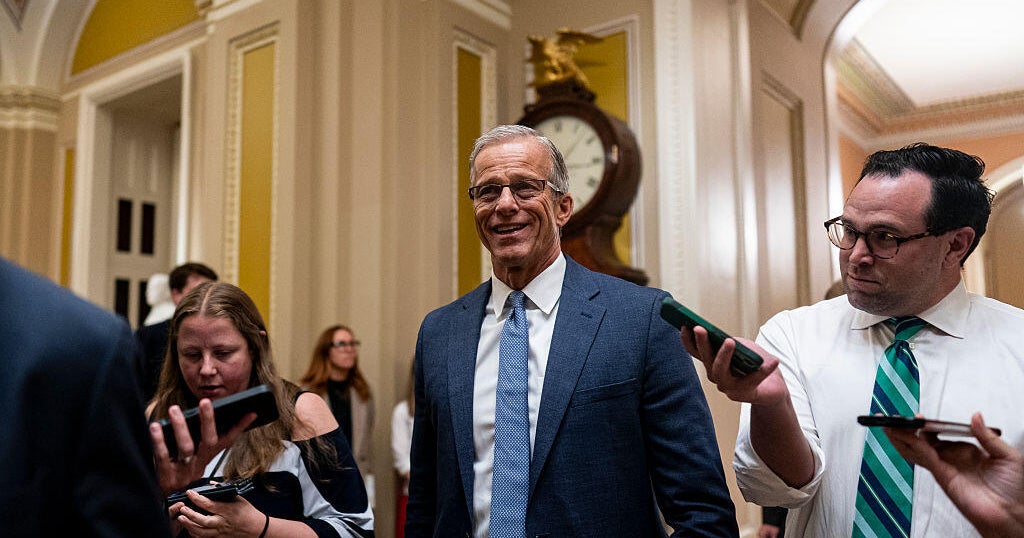
Washington — The Senate is nearing a final vote on President Trump’s massive tax and spending bill after a marathon series of amendment votes that stretched more than 24 hours as Republicans work to pass the centerpiece legislation of Mr. Trump’s second-term agenda.
Senate Majority Leader John Thune has been working to sway GOP holdouts to back the legislation amid opposition on multiple fronts that has threatened to thwart the bill’s progress in recent days.
Asked on Capitol Hill whether Republicans had a deal to pass the bill, Thune replied, “I believe we do. But, like I said, I’m of Scandinavian heritage, always a bit of a realist. So, we’ll see what happens.”
Formally titled “One Big, Beautiful Bill,” the legislation includes increased spending for border security, defense and energy production and trillions of dollars in tax cuts, partially offset by cuts to health care and nutrition programs. The Congressional Budget Office estimated Sunday that the legislation would increase the deficit by nearly $3.3 trillion over the next decade.
While some Republicans have taken issue with the legislation’s impact on the deficit, others have cited concern with some of the cuts to Medicaid. And with a 53-seat majority, Senate GOP leaders can only afford to lose three Republican votes. Vice President JD Vance arrived at the Capitol on Tuesday morning, and would deliver a tie-breaking vote for the GOP if need be.
Thune, a South Dakota Republican, met with possible holdouts in his office as the vote series stretched late Monday and into the wee hours Tuesday. The majority leader met with fiscal hawks including Sens. Ron Johnson of Wisconsin and Rick Scott of Florida. At another point in the night, he met with Sen. Rand Paul of Kentucky, who has pledged to oppose the bill due to a provision raising the debt ceiling by $5 trillion.
Thune also met briefly with Sen. Lisa Murkowski, an Alaska Republican, early Tuesday, as it appeared likely that Murkowski’s vote could make or break the bill in the Senate.
The path to passage
Senate Republicans advanced the legislation late Saturday, with all but two voting in favor following hours of delay as the GOP worked to iron out last-minute details and dispel concern among holdouts, including the fiscal hawks, Murkowski and Sen. Susan Collins of Maine. But the vote to advance the measure did not cement their support on final passage.
Paul and Sen. Thom Tillis of North Carolina were the two Republicans to oppose the bill’s advancement Saturday, and are expected to oppose the legislation on final passage. With a handful of other possible opponents, Thune told reporters overnight that GOP leaders were working to determine what “everybody has to have in terms of votes.”
The Senate action comes after the House narrowly passed the bill last month. Senate Republicans have been working to put their mark on the legislation, treading carefully so as not to throw off the delicate balance in the lower chamber. The House will need to approve the Senate’s changes to the bill before it can head to the president’s desk for his signature. And lawmakers are trying to move quickly, with a self-imposed July 4 deadline to get the measure signed.
The Senate worked through the weekend as the GOP entered a final sprint on the legislation ahead of the deadline.
Senate Republicans have been pursuing the legislation through the budget reconciliation process, which enables the party in the majority to move ahead without support from across the aisle.
Senate Democrats combatted the legislation in one of the only ways available to them: by delaying the process. Democrats forced the bill to be read in its entirety over the weekend, totaling nearly 16 hours, before using debate time to rail against the bill, and proposing amendments to put their GOP colleagues on the record on a number of controversial issues ahead of the midterm elections.
On Monday, the Senate began what’s known as a “vote-a-rama,” in which senators could offer an unlimited number of amendments and force the chamber to cast vote after vote. Democrats proposed a number of amendments to attempt to roll back some of the bill’s more controversial provisions, to no avail. As the votes stretched overnight Monday and into Tuesday, senators voted on a handful of notable amendments, including a near-unanimous vote to eliminate language from the bill that would have put a pause on state regulations on artificial intelligence. The Senate also approved an amendment to move up Medicaid eligibility verification requirements preventing payments for people who are deceased.
An amendment proposed by Collins that would have increased the rural hospital stabilization fund from $25 billion to $50 billion and imposed a higher tax rate on the wealthy to pay for the larger fund fell short. Senate Minority Leader Chuck Schumer told reporters ahead of the vote that the amendment was like putting a “band aid on an amputation — it doesn’t fix the problem.” The outcome made it less likely that Collins would ultimately support the bill.
During the marathon vote series, the Senate also addressed an outstanding disagreement over the current policy baseline, an accounting approach that would make it appear that extending the current tax policy would cost nothing. Though Democrats railed against the move as the “nuclear option,” the chamber voted along party lines, to affirm the use of the current policy baseline.
